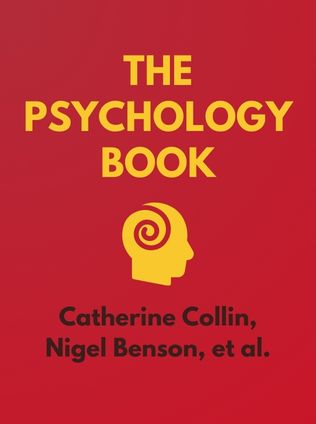
The Psychology Book
Big Ideas Simply Explained
By Catherine Collin, Nigel Benson, et al.
Published 01/2011
About the Author
"The Psychology Book" is a collaborative work by six authors: Catherine Collin, Nigel Benson, Joannah Ginsburg, Voula Grand, Merrin Lazyan, and Marcus Weeks. Each author brings a unique perspective to the text, drawn from diverse professional backgrounds in clinical psychology, business psychology, journalism, writing and editing, and music. Together, they provide a rich, multifaceted view of psychology, blending historical context with modern developments. Their collective expertise allows them to distill complex psychological concepts into an accessible and engaging narrative, making the book both educational and inspiring for readers interested in the mind and behavior.
Main Idea
"The Psychology Book" offers a comprehensive overview of the evolution of psychology, from its philosophical roots in antiquity to the modern-day study of mental processes and behavior. The authors aim to make the field of psychology accessible to a broad audience, presenting key concepts, theories, and the most influential thinkers in a way that is both informative and thought-provoking. By exploring the origins and development of major psychological disciplines—such as behaviorism, psychoanalysis, cognitive psychology, social psychology, developmental psychology, and differential psychology—the book serves as both a historical account and a guide to understanding the fundamental principles of psychology.
Table of Contents
- Introduction to Psychology
- The Origins of Psychology
- Behaviorism: Understanding Behavior
- Psychoanalysis: The Unconscious Mind
- Cognitive Psychology: Mental Processes
- Social Psychology: The Individual and Society
- Developmental Psychology: Cognitive Growth
- Differential Psychology: Individual Differences
- Conclusion: The Future of Psychology
Introduction to Psychology
Psychology, at its core, is the study of the mind and behavior. It seeks to understand how we think, feel, and act—both as individuals and within groups. "The Psychology Book" begins by addressing the fundamental questions that have driven psychological inquiry for centuries: What is the nature of the mind? How does it influence our actions? And how can we study something as intangible as thought or emotion? These questions set the stage for a deep dive into the history of psychology, where each chapter builds upon the previous to trace the development of psychological thought through the ages.
The Origins of Psychology
The roots of psychology can be traced back to ancient Greece, where philosophers like Plato and Aristotle began to explore the nature of the mind, or psyche. Plato proposed that the mind and body were separate entities, a concept known as dualism. This idea laid the groundwork for centuries of debate about the relationship between mental and physical processes. In the 17th century, René Descartes expanded on this notion, famously declaring, "I think, therefore I am," suggesting that consciousness was the defining feature of the mind. Descartes’ work on the "mind-body problem"—the question of how an immaterial mind can influence a material body—remains a central issue in both psychology and philosophy.
Early Ideas About Consciousness
Plato and Descartes' dualism was challenged by materialist views that emerged later, particularly with the advent of scientific inquiry during the Enlightenment. Materialists argued that mental processes are entirely the result of physical brain activity, rejecting the idea of an immaterial mind. This debate set the stage for the emergence of experimental psychology in the 19th century, as scientists began to seek empirical evidence for their theories about the mind.
The Mind-Body Problem
The mind-body problem has been explored from various angles throughout history. Some thinkers, like Descartes, believed in the separation of mind and body, while others, including many modern neuroscientists, argue that the mind is simply a product of brain activity. This ongoing debate highlights the complexity of understanding consciousness, which remains one of the most intriguing and elusive topics in psychology.
“The mind is its own place, and in itself can make a heaven of hell, a hell of heaven.” — John Milton
This quote by John Milton captures the essence of the mind-body problem, illustrating how our mental state can profoundly influence our perception of reality.
Behaviorism: Understanding Behavior
As psychology developed into a scientific discipline, researchers began to focus on observable behavior rather than abstract mental processes. This shift gave rise to behaviorism, a school of thought that emphasizes the role of environmental stimuli in shaping behavior. Behaviorists argue that all behaviors are learned through interaction with the environment, and they sought to understand these processes through controlled experiments.
Classical Conditioning
One of the most famous behaviorist experiments was conducted by Ivan Pavlov, who demonstrated the concept of classical conditioning. Pavlov showed that dogs could be conditioned to salivate at the sound of a bell if the bell was consistently paired with food. This experiment illustrated the power of associative learning and laid the foundation for further studies on how behaviors are acquired.
Sign up for FREE and get access to 1,400+ books summaries.
You May Also Like
The Subtle Art of Not Giving a F*ck
A Counterintuitive Approach to Living a Good Life
By Mark MansonHow To Win Friends and Influence People
The All-Time Classic Manual Of People Skills
By Dale CarnegieFreakonomics
A Rogue Economist Explores the Hidden Side of Everything
By Steven D. Levitt and Stephen J. Dubner



















